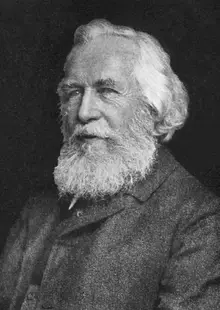
Ernst Haeckel
Ernst Heinrich Philipp August Haeckel was a German zoologist, naturalist, eugenicist, philosopher, physician, professor, marine biologist and artist. He discovered, described and named thousands of new species, mapped a genealogical tree relating all life forms and coined many terms in biology, including ecology, phylum, phylogeny, and Protista. Haeckel promoted and popularised Charles Darwin's work in Germany and developed the influential but no longer widely held recapitulation theory claiming that an individual organism's biological development, or ontogeny, parallels and summarises its species' evolutionary development, or phylogeny.

The Evolution of Man
Discover the illustrated journey through human origins, where embryos reveal our deep connections to the animal kingdom.
By Ernst Haeckel

The Evolution of Man — Volume 1
Witness the astounding claim that the secrets to humanity's origins lie hidden within the earliest stages of human growth.
By Ernst Haeckel
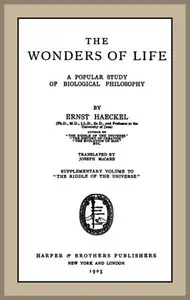
The Wonders of Life: A Popular Study of Biological Philosophy
Embark on a journey through the science of life, where the pursuit of knowledge intertwines with the very nature of living organisms, challenging traditional beliefs and inviting readers to explore the profound connection between mind and matter.
By Ernst Haeckel
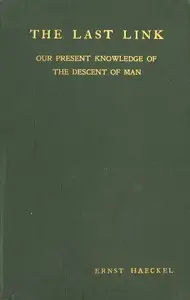
The Last Link: Our Present Knowledge of the Descent of Man
Embark on a scientific journey to uncover humanity's primal origins, venturing into a history changing exploration of our evolutionary link to the animal kingdom.
By Ernst Haeckel
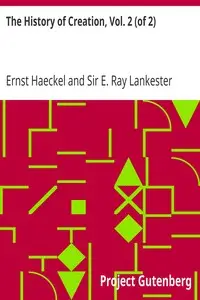
The History of Creation, Vol. 2 (of 2) Or the Development of the Earth and its Inhabitants by the Action of Natural Causes
Journey through time to witness life's evolutionary saga, where fossils and embryos whisper secrets of how organisms transformed across geologic epochs.
By Ernst Haeckel

Freedom in Science and Teaching. from the German of Ernst Haeckel
A scientist defends the right to explore evolution without limits, igniting a debate about knowledge and the freedom to teach in the face of strong disagreement.
By Ernst Haeckel

Monism as Connecting Religion and Science A Man of Science
In a time of conflict between science and religion, one man tries to unite them through the idea that everything is connected.
By Ernst Haeckel
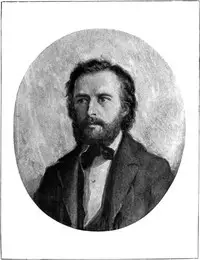
The Riddle of the Universe at the close of the nineteenth century
As science rushes forward, humanity is forced to look at its place in the universe and answer the biggest questions of existence and the meaning of it all.
By Ernst Haeckel
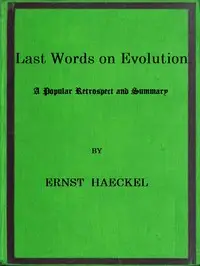
Last Words on Evolution: A Popular Retrospect and Summary
A scientist spends his last days fighting for evolution.
By Ernst Haeckel

The Evolution of Man — Volume 2
Explore the origins of humanity's place in the world, where the development of the individual mirrors the journey of the species.
By Ernst Haeckel
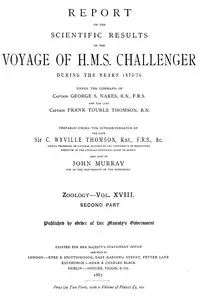
Report on the Radiolaria Collected by H.M.S. Challenger During the Years 1873-1876, Second Part: Subclass Osculosa; Index Report on the Scientific Results of the Voyage of H.M.S. Challenger During the Years 1873-76, Vol. XVIII
Embark on a voyage to the microscopic world where intricate silica skeletons reveal the secrets of single-celled organisms collected from the depths of the sea.
By Ernst Haeckel
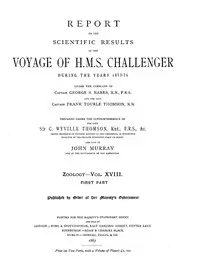
Report on the Radiolaria Collected by H.M.S. Challenger During the Years 1873-1876, First Part: Porulosa (Spumellaria and Acantharia) Report on the Scientific Results of the Voyage of H.M.S. Challenger During the Years 1873-76, Vol. XVIII
Venture into the depths of the 19th-century ocean to uncover a hidden universe of microscopic life, where a scientist painstakingly reveals the beauty and complexity of thousands of Radiolarian species.
By Ernst Haeckel
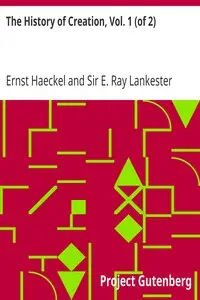
The History of Creation, Vol. 1 (of 2) Or the Development of the Earth and its Inhabitants by the Action of Natural Causes
Discover how life on Earth evolved through natural processes, challenging traditional beliefs about creation.
By Ernst Haeckel
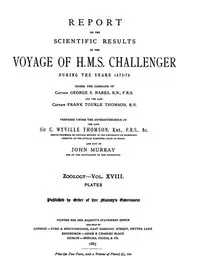
Report on the Radiolaria Collected by H.M.S. Challenger During the Years 1873-1876, Plates Report on the Scientific Results of the Voyage of H.M.S. Challenger During the Years 1873-76, Vol. XVIII
Embark on a 19th-century scientific voyage to discover a hidden world of single-celled organisms through detailed illustrations and descriptions from a groundbreaking ocean expedition.
By Ernst Haeckel
